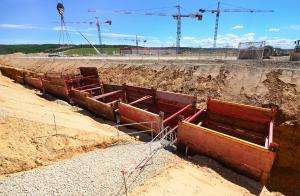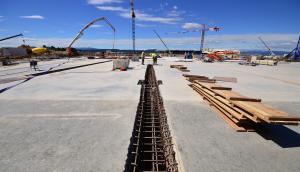Progress on stage and behind the scenes
The ITER site has undergone significant transformation in the past year. Following the completion of the Seismic Isolation Pit for the Tokamak Complex in April 2012, attention turned to site infrastructure works such as the deep drainage networks, critical networks, the creation of a platform Contractors Area (from where the different construction work packages will be managed), and finally the foundation for the Assembly Building. These projects are now in their final phases. As the focus returns to the heart of the ITER platform—the Tokamak Pit, where concrete pouring will resume this year—we asked Laurent Schmieder, project manager of the division for site, buildings and power supplies at the European Domestic Agency Fusion for Energy (F4E), about the state-of-works on the platform and what we can expect to see in the months to come.
Newsline: A new phase of construction is about to begin. Can you describe what has been accomplished on the ITER platform since the last major milestone of Seismic Isolation Pit completion?
As you can see, we are making tremendous, behind-the-scenes progress. Each contract signature signifies that the tender design period is over and that the baton is being transferred to the contractors. But each signature is also an important and visible signal for the ITER Project of progress made in construction.
In 2014, F4E expects to have approximately 2,000 workers on the platform, all contracts combined. And from that moment forward, the construction site will be a hive of activity for years! On top of the challenge of keeping to schedule, we will pay very particular attention to health and safety. F4E will also be implicated in the overall organization and coordination of the construction site because—despite the general impression that the ITER site is very large—in actual fact we will see that, progressively, all pieces of available land will be used by the contractors. In this context, access control and space management will be key elements to be able to optimize the schedule.




